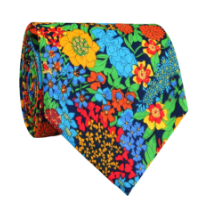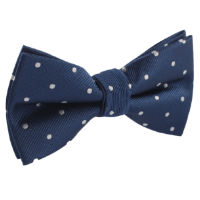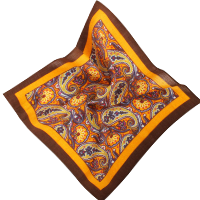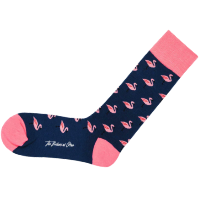Cheap vs. Expensive Suits
Suits are the pinnacle of men's fashion, combining style, sophistication, and the elegance of well-chosen ties in a single outfit. Ultimately, a cheap vs. expensive suit comes down to differences in fit, quality, and overall presentation. Let's explore what each option brings to the table to help you choose the suit — and necktie — that best complements your style.
Ready-Made Suits vs. Tailor-Made Suits
What Is a Ready-Made Suit?
A ready-made, off-the-rack suit is pre-designed and manufactured in standard sizes, making it available directly in stores or online. Created in bulk based on general sizing, these suits are accessible and often more budget-friendly. Ready-made suits come in limited styles, colours, and fabrics aligned with general trends. Pairing one with accessories like bow ties and cufflinks can add a personal touch to standard styles, allowing you to elevate a ready-made suit to match your look and occasion.
What Is a Tailor-Made Suit?
A tailor-made bespoke or custom suit is crafted specifically for you based on your exact measurements, style preferences, and fabric choice. These suits require a detailed process involving fittings and consultations with a tailor to create a unique fit. Tailor-made suits offer various customisation options, from lapel shape to button placement and fabric selection.
Who Is Each Type of Suit Recommended For?
Wearing Ready-Made Suits
If you need a suit quickly or are just starting with professional attire, a ready-made suit can be an excellent choice. It's perfect for exploring different styles without significant investment and works well if you don't expect to wear suits frequently. Ready-made suits offer flexibility and save you the cost and commitment of bespoke tailoring. For instance, ready-made suits are ideal for business meetings, casual events, or occasional gatherings where you need a sharp, classic look.
Wearing Tailor-Made Suits
A tailor-made suit is ideal after a refined fit and unique, personalised features. This option works best if you wear suits regularly or have specific fabric or style preferences. With tailor-made suits, you get a garment that reflects your style and meets your fit requirements. For instance, the best presidential suits have all been tailor-made to reflect the individual's style and the occasion's needs.
Tailor-made suits are perfect for weddings, upscale dinners, or professional settings where a precise, unique fit adds confidence and sophistication. The best film suits often demonstrate the elegance and precision that comes with tailoring for memorable, screen-worthy style.
The $399 Suit vs. the $7,900 Suit: Key Differences
As you already know, not all suits are created equal, and the price tag usually reflects this. While many focus on the fit and fabric alone, other aspects—such as the craftsmanship, colour variety, and the suit's finish—can make or break your look. To help guide your choice between a budget-friendly style and a premium option, we're sharing some key points to consider.
Design

Ready-made suits are produced in bulk for a general fit and often require adjustments for a more tailored look. In contrast, high-end suits are crafted with meticulous attention to detail and designed to contour closely to your body and fit like a second skin.
Material and Shade
Cheaper suits use fabrics like polyester or rayon, which can have a noticeable shine in sunlight. Higher-quality suits are made of 100% virgin wool with a soft, refined lustre. The material offers a richer look and feel, reflecting the investment in quality.
Construction

Inexpensive suits are often glued rather than sewn and can contain stitching flaws, while hand-sewn suits crafted by skilled tailors have precise and durable stitching and offer a longer-lasting garment.
Customer Service
High-end suit shops offer personal service, custom measurements, and individual consultations to ensure the perfect fit. In contrast, lower-cost suits often lack personalised customer support.
Brand Reputation
Many lower-cost suits are sold with a brand name, making quality assessment easier. In contrast, reputable brands assure craftsmanship and materials.
Pros and Cons of Ready-Made vs. Tailor-Made Suits
Pros of Ready-Made Suits
- Affordability: Typically less expensive than tailor-made suits.
- Convenience: Available for immediate purchase, ideal for last-minute events.
- Range of styles: Accessible in multiple designs across most clothing retailers.
Cons of Ready-Made Suits
- Fit limitations: Standard sizes may not be ideal, often requiring minor alterations.
- Quality limitations: Generally, fabrics and construction could be more refined than bespoke options.
- Limited personalisation: Pre-made designs mean fewer style, fabric, and detailing choices.
Pros of Tailor-Made Suits
- Perfect fit: Customised to your exact measurements for a personalised fit.
- High quality: Higher quality materials and craftsmanship are standard.
- Full personalisation: Allows control over all aspects, including fabric, lapel type, and buttons.
Cons of Tailor-Made Suits
- Higher Cost: More expensive than off-the-rack suits due to materials and craftsmanship.
- Time-Intensive: Requires several fittings and may take weeks or months to complete.
- Maintenance Needs: Tailored suits often require specific care to preserve their quality.
Price Points for Suits
Here are some example price points to give you some idea of the investment necessary for a new suit. While this pricing is specific to shopping in New York City, it still demonstrates the wide range of suit options, from budget-friendly to high-end bespoke tailoring:
Ready-to-wear suits ($399): These professional styles are affordable year-round and perfect for quick wardrobe upgrades.
Bespoke suits ($1,470): Customisable down to the details, bespoke suits offer a personalised look that begins with a virtual consultation.
Handmade suits ($7,900): Experienced suitmakers often request multiple fittings to ensure a flawless, tailored fit for those seeking the ultimate custom experience.
Some luxury men's suits can cost more than cars or boats. For example, designer William Fioravanti, renowned in Italian fashion for over 35 years, has crafted bespoke suits for notable figures. His custom designs range from $20,000 to $22,000, earning him a reputation as the industry's standard-setter.
Frequently Asked Questions
What is the difference between ready-made suits and tailored suits?
Ready-made suits are pre-constructed in standard sizes, while tailored suits are custom-fitted or custom-made to match the individual's specific measurements and preferences.
What is the difference between made-to-wear and ready-to-wear?
Ready-to-wear suits are mass-produced in set sizes and available immediately. In contrast, made-to-wear (or made-to-measure) suits are adjusted to fit a specific person's measurements from a pre-designed template.
Can you tailor a ready-to-wear suit?
Yes, a ready-to-wear suit can be altered for a better fit, although it won't achieve the precision of a custom-made suit.
What is the difference between ready-made and ready-to-wear?
"Ready-made" and "ready-to-wear" are often used interchangeably. Both refer to garments produced in standard sizes for immediate purchase and wear.






